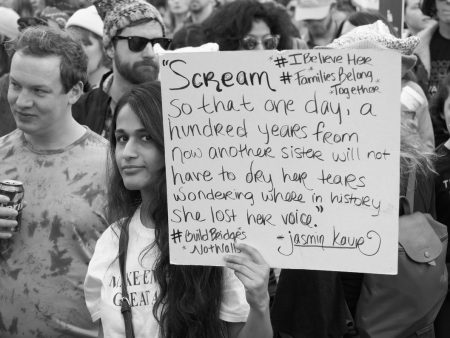#YouShouldBelieveHer
29 June 2020
We believe what other people tell us. I trust that you are on the way to the mall if you tell me you are on the way to the mall; I believe that the price of oil has gone down because I heard it on the news. In the summer I will go hiking in the Carpathians; I remember my geography teacher told us that wild life is gorgeous over there. And I believed him.
Unless we have reason to be suspicious of them, we believe what other people tell us, and that’s all right!!! We don’t need to check on all the facts ourselves; we can’t do that anyway, we are physically and psychologically limited creatures. When is the last time you went to check the height of the tallest peak in the Carpathians yourself?
We especially readily believe people – and, indeed, should do so – when they have some sort of privileged access to the fact. Because they know best, for instance: I believe that you feel pain; after all, you know best how you feel. Because they were there when the event in question happened: I believe that you had eggs for breakfast this morning if you say so; after all, you were there when that happened. Because they’re experts in the field: I believe my doctor when she says I have gastritis, she’s a gastroenterologist, she would know.
Here’s a mysterious phenomenon, though: we rarely go ahead and believe victims based on mere say-so. Although surely they know best – after all, they were there, and we weren’t. Victims are experts in what happened to them: they have privileged access. However, we rarely take them at their word.
When she says he sexually assaulted her, for instance, we usually suspend belief until further evidence presents itself. At best. Some of us even go ahead and suspect she’s lying from the outset. But leaving those aside, even the most reasonable amongst us are, weirdly enough, perfectly willing to believe the victim when she says she had eggs for breakfast, but not when she says she was sexually assaulted.
What’s going on? I conjecture that even the most reasonable amongst us are mistaken about the evidentiary profile of the case. I suspect, that is, that when my perfectly reasonable, feminist grandmother suspends belief about the testimony of a victim of sexual assault, she does so because she takes herself to be rationally compelled to do so given the evidence she’s got. Or so I hope.
Here’s how I think my grandmother and all other reasonable folk like her think about these issues: the woman said he did it; the guy said he did not; I wasn’t there to see it happen with my own eyes; therefore, I have equally weighty evidence in favour of the claim of sexual assault and against it; therefore, I should suspend belief until I get more evidence.
If that’s what my grandmother thinks, she’s wrong. Blamelessly so – researchers in theory of knowledge don’t always fancy doing publicly engaged philosophy, so they haven’t done much to teach my grandma otherwise; but she’s wrong. And we should teach her to do better.
To get one thing out of the way: the reason why my grandma suspends belief cannot be because a lot is at stake. My grandma is not a judge: ‘innocent until proven guilty’ is not the right standard for belief here. To see why, note that my grandma’s belief, as opposed to the judge’s belief, is not very likely to trigger a conviction. Nothing hinges for him, the alleged aggressor, on whether my grandma believes he did it or not.
There’s been a wee bit of support for a belief default reaction in recent years: the wonderful #Ibelieveher movement is one notable example. And there have been a couple of rationales that have been circulated in the public sphere in support of belief as the default reaction to victim testimony. One such rationale is grounded on moral considerations: the victim, research shows, is harmed further by disbelief. As such, the thought goes, although we’re in a perfectly balanced evidentiary situation, moral considerations suggest we should start by believing her. That’s a good thought. However, one could worry that moral reasons are only good reasons to express belief in this case – in order to avoid further harm to the victim – but not to actually believe. After, all, it looks as though we can’t really believe at will, against the evidence: if I see that there’s a computer in front of me while I write this paper, no moral reasons are going to be strong enough to make me believe otherwise.
Another, more evidentiary grounded rationale relies on the overwhelming statistics (Lisak et al., 2010): studies consistently report a minuscule prevalence of false allegations of sexual assault (5.9%). Furthermore, false allegations are usually correlated with a history of either mental illness or crime on the alleged victim’s side. This suggests, the argument goes, that, absent such indicators, we have excellent statistical evidence in favour of believing the victims. The worry for this line of reasoning is that high probabilities alone cannot generate knowledge, and that we should not believe what we don’t know to be true: after all, I can’t know that my lottery ticket will not win, no matter how high the probability. If I could, it would be rational for me to just throw it out before the draw even happens. But it’s not. Similarly, the thought goes, we cannot know that he did it based on the mere high probability that he did. So I shouldn’t believe it.
Here’s the thing, though: moral and statistical reasons, while good to have in support of the case for belief as the default rational position to take in the face of victim testimony, are not needed. And that’s because, against my grandma’s epistemological assessment, the evidentiary situation is not balanced in cases of victim testimony.
Here is why, in a nutshell: all else being equal, we have good reason to believe he’s lying; after all, whether he did it or not, we know it’s in his interest to say that he did not. If so, as epistemologists put it, the evidence provided by his testimony is, at least to some extent, defeated: we have some reason against believing him. In contrast, we know she has very little reason to lie: (unless we know otherwise, of course), she doesn’t stand to gain anything from making these allegations. To the contrary, if anything, she stands to lose from coming forward and testifying, in terms of reputation, but also in terms of the sheer harm that others’ disbelief is bound to cause her. It is unsurprising, in the light of this, that more than 60% (Rennison, 2002) of cases of sexual assault go unreported. Given all this, i.e. all the reasons she has to keep quiet, when she does come forward, her testimony, as opposed to his, is not affected by defeat.
We have reasons against believing him: he’s interested in lying. We have no reasons against believing her: if anything, she’s interested in keeping quiet. That is the default evidentiary situation in cases sexual assault allegations. That’s why my grandma is wrong: the evidentiary picture is hardly balanced. She should not suspend belief: she should believe her. And that’s not because of moral reasons or on mere statistical grounds: that’s just because it’s the rational thing to do, given the evidence.
One last thing before I close: in two thousand years of history of philosophy, philosophers haven’t agreed on much; indeed, when presented with its history, one could reasonably think disagreement is the very raison d’etre of the profession. Here is one bit of curios data though: what I said above trivially follows on both main competing views in the epistemology of testimony.
According to Testimonial Reductionism, one is justified in believing based on someone else’s say-so just in case one either has evidence that testimony is a generally reliable source of knowledge, or else, evidence that the particular testifier at stake is reliable. Testimonial Anti-Reductionism disagrees: the default position, absent defeat, in cases of testimony, is belief. It is easy to see that, although disagreeing profoundly otherwise, both views agree about the correct verdict in the case of sexual assault allegations. On Anti-Reductionism, since we have no reason to believe she’s lying, but we do have reasons to believe he is, we should go ahead and believe her. According to Reductionism, since we have evidence that victim testimony is extremely reliable, and, on top of this, we also have reason to think this particular testifier is telling the truth – after all, she’s testifying against her own best interest – we should go ahead and believe her.
Hear, hear!!! for the first ever consensus in philosophy: now all we have to do is get better at telling my grandma about our results.
Picture by Luke Harold.
Comments
1 comment
Comments are closed.
- July 2024
- June 2024
- May 2024
- April 2024
- March 2024
- February 2024
- January 2024
- December 2023
- November 2023
- October 2023
- September 2023
- August 2023
- July 2023
- June 2023
- May 2023
- April 2023
- March 2023
- February 2023
- January 2023
- December 2022
- November 2022
- October 2022
- September 2022
- August 2022
- July 2022
- June 2022
- May 2022
- April 2022
- March 2022
- February 2022
- January 2022
- December 2021
- November 2021
- October 2021
- September 2021
- August 2021
- July 2021
- June 2021
- May 2021
- April 2021
- March 2021
- February 2021
- January 2021
- December 2020
- November 2020
- October 2020
- September 2020
- August 2020
- July 2020
- June 2020
- May 2020
- April 2020
- March 2020
- February 2020
- January 2020
- December 2019
- November 2019
- October 2019
- September 2019
- August 2019
- July 2019
- June 2019
- May 2019
- April 2019
- March 2019
- February 2019
- January 2019
- December 2018
- November 2018
- October 2018
- September 2018
- August 2018
- July 2018
- June 2018
- May 2018
- April 2018
- March 2018
- February 2018
- January 2018
- December 2017
- November 2017
- October 2017
- September 2017
- August 2017
- July 2017
- June 2017
- May 2017


I appreciate Dr. Simion’s distinction between the evidence required for a legal verdict, as issued e.g. by a court judge, and the evidence required for the general public to form a legitimate opinion. The problem is that we now live in a “cancel culture” and the evidentiary bar for assertions made on social media ought to be proportional to the amount of not insignificant damage incurred by them. If, for instance, an influencer’s verdict on someone’s purported wrongdoing gets publicly tweeted, the likelihood that this will bring about potentially severe consequences for the accused is increasingly high. The accused stands to lose their job and job potential, the support of their communities, families, etc. Second, although currently there seem to be more defeaters on the side of the accused than that of the testifier, I’m curious whether the tide will change. As the cultural environment for victim testimony changes (in large part thanks to the consensus Dr. Simion identifies and social movements like Me Too), i.e. as it becomes more comfortable (not that it will ever become easy or comfortable for victims of abuse to come forward) and more successful to present such testimony, (i.e. damaging to the accused and socially beneficial, in terms of praise and social support, to the testifier), won’t there be at least an equal number of defeaters on the side of the testifier as on the side of the accused?